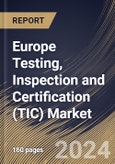The Germany market dominated the Europe Testing, Inspection and Certification (TIC) Market by country in 2023, and is projected to continue to be a dominant market till 2031; thereby, achieving a market value of $21.59 billion by 2031 The UK market is exhibiting a CAGR of 3.7% during 2024-2031. Additionally, the France market is anticipated to experience a CAGR of 4.3% during 2024-2031.
the introduction of automated systems along with additional technologies into consumer and business applications will play a significant role in determining the scope and significance of TIC services.
Additionally, the current development in the testing, inspection, and certification industry is the introduction of digital technology. Adopting digital technology is a top priority for companies because it is expected to speed up market growth.
Europe has several leading TIC service providers catering to various industries, including automotive, aerospace, healthcare, manufacturing, and environmental services. According to the TIC Council, the European TIC sector is typically regarded as the largest in the world due to the extensive regulation and complexity across many countries in the region. A third of the demand for TIC in 2017, the European conformity assessment business reached $71 billion in 2020, with the independent TIC sector accounting for about 35.6% of this total, and it is anticipated to increase to $85-98 billion by the end of 2024.
Based on Service Type, the market is segmented into Testing, Inspection, and Certification. Based on Sourcing Type, the market is segmented into In-house and Outsourced. Based on Application, the market is segmented into Consumer Goods & Retail, Agriculture & Food, Chemicals, Infrastructure, Manufacturing, Medical & Lifesciences, Mining, Oil & Gas, Automotive, Public Sector, and IT, Telecom & Others. Based on countries, the market is segmented into Germany, UK, France, Russia, Spain, Italy, and Rest of Europe.
List of Key Companies Profiled
- SGS S.A.
- Bureau Veritas S.A.
- Intertek Group PLC
- Eurofins Scientific SE
- TÜV Rheinland AG
- Applus+ Group
- TÜV Nord Group
- DEKRA SE
- TÜV SUD
- DNV AS
Market Report Segmentation
By Service Type
- Testing
- Inspection
- Certification
By Sourcing Type
- In-house
- Outsourced
By Application
- Consumer Goods & Retail
- Agriculture & Food
- Chemicals
- Infrastructure
- Manufacturing
- Medical & Lifesciences
- Mining, Oil & Gas
- Automotive
- Public Sector
- IT, Telecom & Others
By Country
- Germany
- UK
- France
- Russia
- Spain
- Italy
- Rest of Europe
Table of Contents
Companies Mentioned
- SGS S.A.
- Bureau Veritas S.A.
- Intertek Group PLC
- Eurofins Scientific SE
- TÜV Rheinland AG
- Applus+ Group
- TÜV Nord Group
- DEKRA SE
- TÜV SUD
- DNV AS








